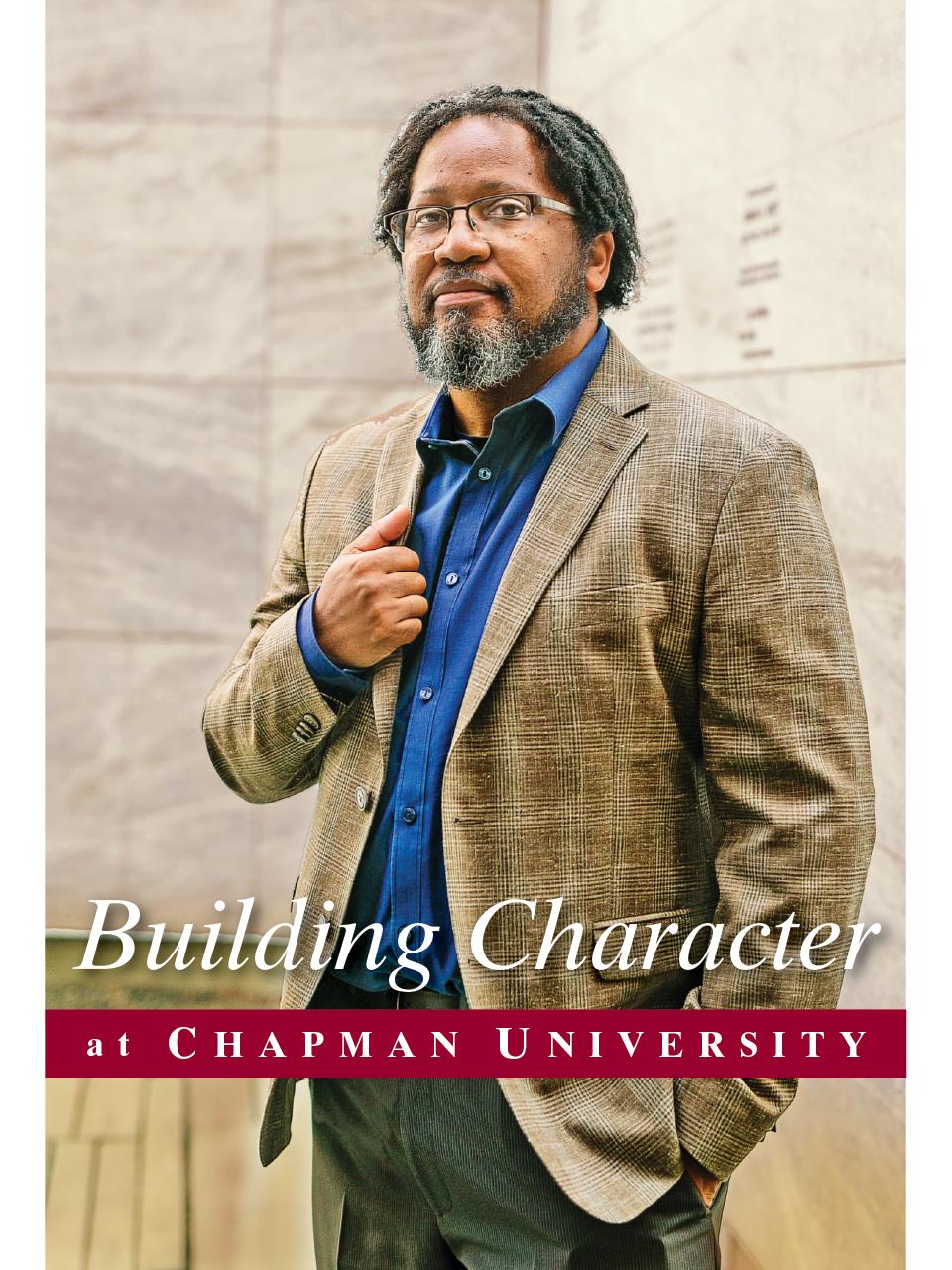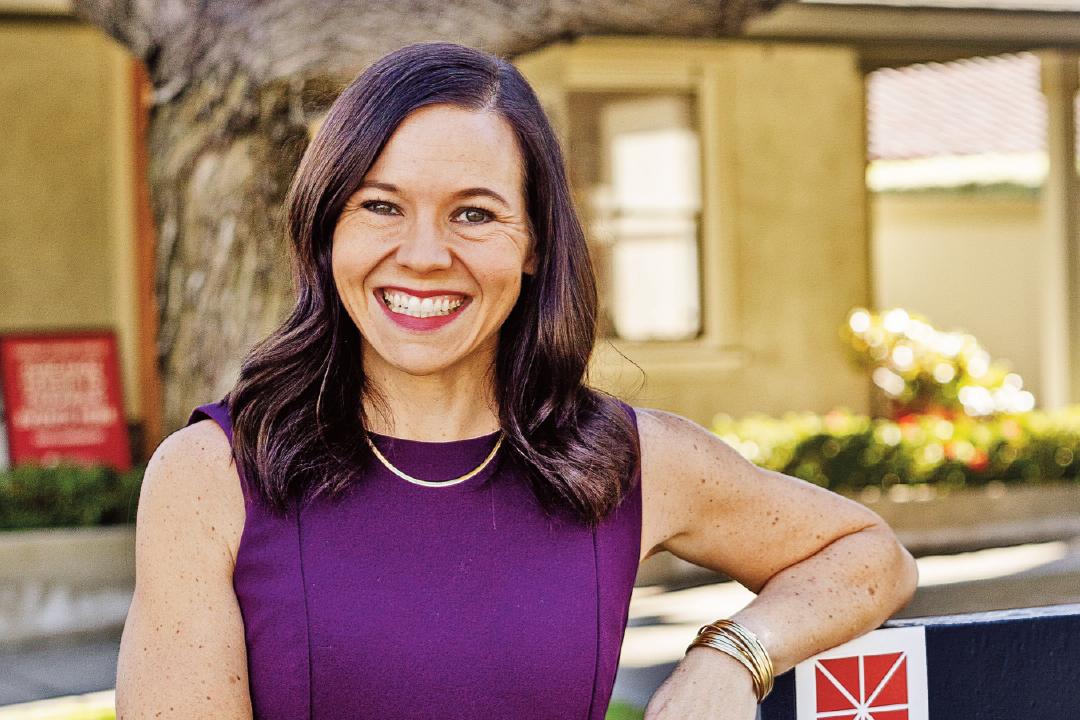
Reg Chhen Stewart, PhD
When Reg Stewart was in college, he had a seemingly random experience that wasn’t so random after all. In fact, the experience led him to an on-campus job that helped shape his world view and paved the way for his career in Diversity, Equity and Inclusion (DEI).
For Chapman’s University’s new Vice President of Diversity, Equity and Inclusion, it all began during his freshman year at San Francisco State. “I was living in the resident hall, and every morning at 7:40 I’d be woken up by a gut-wrenching noise that sounded like a cross between a clutch grinding and a lawnmower on its last leg,” says Stewart. “One morning, I looked out to see a golf cart. There was a 4-digit university extension on the side of the vehicle, so I called and discovered the cart was used by the Disability Resource Center to shuttle students with mobility issues to class. The following semester, I started working there.”
Stewart’s experience at the center altered his perception of the world around him. “The job made me grow up a lot faster than many of my peers,” he says. “Every day, I saw people working to better themselves through education despite some very real challenges. Seeing their determination made me appreciate what I had and kept me humble. I came to feel that I have a personal responsibility to help uplift and move forward people society sometimes forgets.”
Dedicated to Helping People
Years later, a friend gave Stewart a piece of advice that harkened back to those college epiphanies. “He said that you can either make big money or good money. The latter means you get paid to help people achieve their goals. To me, that’s the type of career where when you go to bed each night, no matter how hard the day was, you’ve helped people.”
Over the past three decades with his work leading diversity and inclusion efforts in public and private learning institutions, Stewart has strived to help people. A key piece of that assistance involves sharing the importance of diversity, equity and inclusion.
“Often, when the subject of DEI is brought up, people will say that they don’t like all of the ‘PC stuff,’” says Stewart. “While many think of this acronym as standing for politically correct, I feel it stands for polite company. People are taught that certain subjects require tact when mentioning, such as race, religion and income. My intent is to remain a steady voice leading the effort to help people feel comfortable navigating spaces and topics that aren’t always comfortable.”
Northern California Beginnings
Stewart was born in San Francisco and raised in Oakland. “My father’s family is from New Orleans, so that was like a second home when I was growing up,” he says. “Both areas have a community first orientation that led me to an affinity for that mindset.”
He went to school in the Bay Area, including attending Bishop O‘Dowd High School, a Catholic, college preparatory school in Oakland where he says he learned accountability for his schoolwork and the teachers had high expectations of the students. “I was taught how to be a dedicated student there,” he says. His favorite subject was music. He played saxophone in the school’s jazz band and chamber orchestra ensemble and still enjoys playing the instrument.
In college as a first-generation student in the late 1980s, Stewart originally studied music with the intention of becoming a music critic. But when he learned during a chance encounter with a critic that they generally don’t study music, he decided to move in another direction and major in sociology.
“I studied subjects such as inequity in society and ethnic studies, which sparked an intellectual curiosity about social inequality,” says Stewart. “I also became a member of Alpha Phi Alpha, the first historically black college fraternity, which was founded in 1906. These experiences paved the road to my eventual career in DEI.”
After graduating from San Francisco State University with a Bachelor’s in Sociology, Stewart applied at Huston-Tillotson College (now university) in Austin, Texas, a HBCU (Historically Black College University). He was hired for a position as Upward Bound coordinator in the federally funded TRIO Program where he helped first-generation, low-income students prepare for college. “I loved that position,” he says. “It was a small university and very student-centered.”
Following Texas, he worked at the University of Nevada, Reno for 19 years, including serving the last four years at the senior level as Chief Diversity Officer. He was also involved in a wide variety of equity, inclusion and diversity initiatives. While at the university, he earned his Doctor of Philosophy degree with a major in Educational Leadership.
Inaugural Vice President for Diversity and Inclusion
In 2015, Stewart decided to join Iowa State University as the inaugural Vice President for Diversity and Inclusion (VPDI). That job and his current position at Chapman involves two roles: Chief Diversity Officer, which entails work related to compliance and reporting possible equal opportunity issues and Vice President of Diversity, which requires advocating diversity and inclusion amongst the public and throughout the school.
In Iowa, Stewart worked on outreach initiatives with John A. Haila, Mayor of the City of Ames, Iowa. Haila comments on Stewart’s contributions to the city. “Reg is an innovative, creative thinker attuned to various ways to make students and residents feel included, welcomed and valued as individuals. While Reg works hard to move the work forward, it is not from an ‘activist’ initiative. Rather, he knows how to move the work ahead in quiet, progressive ways while working within appropriate ‘structures.’”
When an executive national search firm reached out to Stewart in 2020 about the position at Chapman University, Stewart and his wife, Lee Chhen Stewart, an educator, decided it was time to move their family back to California. “We wanted to come closer to home so that our son and daughter could be nearer to their grandparents,” he says. “When I interviewed for the position at Chapman, I could tell immediately that it would be a good fit for me.”
As he did in Iowa, Stewart is serving as the first Vice President of Diversity, Equity and Inclusion for Chapman. “They’ve had amazing people working on DEI on a volunteer basis at the university,” he says. “The emergence of this office shows a real maturation and growth of the university. Now Chapman is running operations the way top-notch schools around the country do.”
Chapman University President Daniele Struppa agrees. “Chapman has made great progress in becoming an institution welcoming to students from different backgrounds. Reg has great experience as a leader in this area with a reputation for being a sober analyst of situations and a strategic thinker. I have already seen Reg interact in some delicate situations. He is at the same time strong and respectful and direct but tactful. He means what he says while being attentive to the needs of the people with whom he is interacting. I know he will work to help Chapman become an institution that will be looked at as a model for other universities.”



